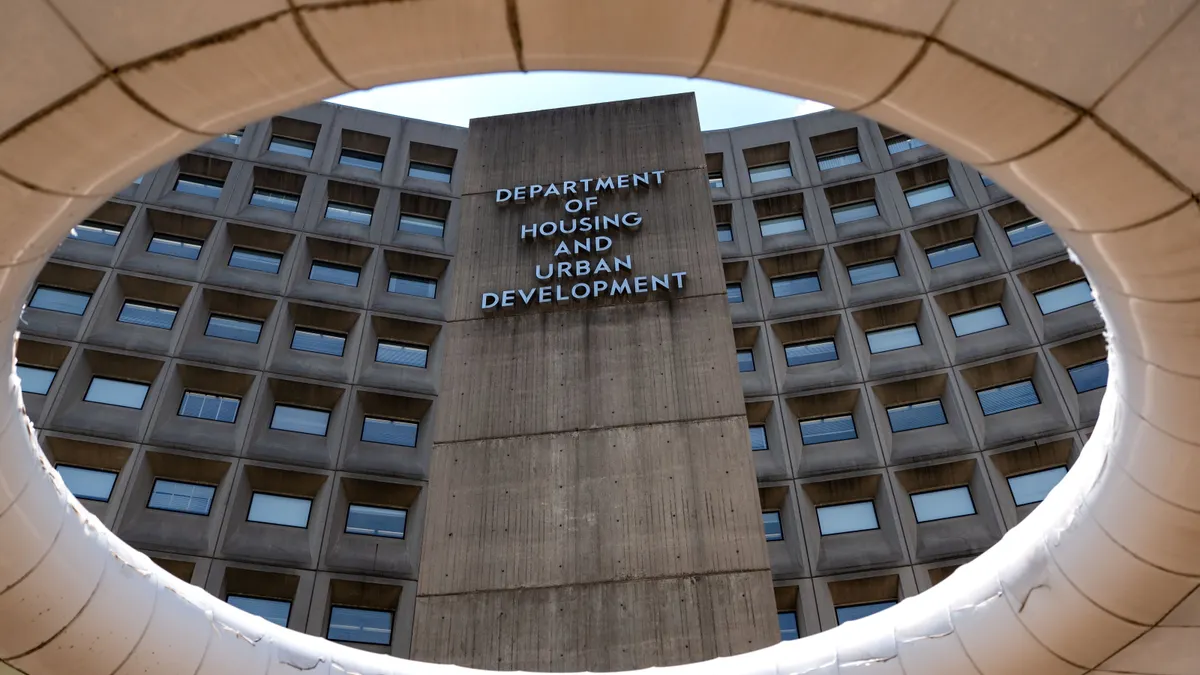Dive Brief:
- Buy now, pay later loans pose little risk to federally insured mortgages because of their short terms and low default rates, trade groups for BNPL providers told the Department of Housing and Urban Development on Monday.
- Various organizations representing banks, credit unions, consumers and the mortgage industry urged HUD to proceed with caution with respect to contemplating new lending regulations. They noted a current dearth of data on BNPL borrowers’ financial health that would help guide HUD policymaking.
- The department collected 41 comments from its June information request before the Monday deadline about how BNPL lending affects homeowners’ financial conditions and the broader housing market.
Dive Insight:
HUD sought to determine if “BNPL-specific policies are warranted” for the Federal Housing Administration to continue supporting financial self-sufficiency and housing stability, the agency said in its request for information from the industry and other stakeholders.
The department oversees a federal fund providing insurance for mortgages that are guaranteed by the FHA.
The American Fintech Council and Financial Technology Association, both of which represent some buy now, pay later providers, said in their comments that BNPL borrowing doesn’t pose a threat to FHA-backed lending.
“Given the robust disclosure and underwriting practices,” coupled with low BNPL default rates below 3%, the fintech council “believes that BNPL obligations do not negatively impact the ability for FHA lenders to accurately assess risk,” wrote Ian P. Moloney, an AFC senior vice president.
The FTA’s chief executive, Penny Lee, wrote Monday that recent efforts to incorporate unsecured BNPL borrowing into credit scores “are encouraging and we support scoring model developments that would allow consumers to build credit through their BNPL use.”
Fair Isaac’s FICO scoring changes to add BNPL loans “could also address any concerns HUD has about the impact of unsecured debt on consumers and mortgage underwriting and repayment,” Lee wrote.
“HUD does not need to change its policies to preserve sound mortgage underwriting standards,” she added.
Multiple organizations noted visibility gaps around BNPL loans as none of the main BNPL players report to all three of the main credit bureaus, Equifax, Experian and TransUnion. Two of the largest providers, Klarna and Afterpay, don’t furnish any data on their BNPL loans.
“Lenders are forced to identify these debts through manual bank statement reviews,” Brendan Kelleher, an associate vice president at the Mortgage Bankers Association, wrote Monday. “This process is inefficient, error-prone, and inconsistent across the industry.”
San Francisco-based Affirm began reporting data to Experian on April 1. In June, FICO said it plans to include BNPL data within some of its credit scores later this year.
FTA members support “modernization” by credit reporting agencies as the current reporting format “is outdated and poorly suited for short-term, flexible products like BNPL,” Lee wrote.
Klarna doesn’t share BNPL data with the credit agencies “because the U.S. credit reporting framework doesn’t yet adequately reflect how short-term BNPL products,” such as those with four installments, are used by consumers, a spokesperson said Tuesday in an email. “We encourage HUD to carefully study this evolving product and welcome the opportunity to assist in those efforts.”
Block-owned Afterpay and Minneapolis-based Sezzle did not respond to emails Tuesday seeking comment.
Current FHA policies “largely exclude” BNPL loans from underwriting determinations, HUD said in its request for comments.
That’s because closed-end debts like BNPL loans don’t have to be included in FHA loan assessments if the debt will be paid off within 10 months from the property closing date and the total payments of all BNPL loans are 5% or less of a borrower’s gross monthly income.
“This exclusion may overlook the cumulative impact of multiple BNPL loans, when stacked or used habitually,” a TransUnion senior vice president, Liz Pagel, said in the credit bureau’s letter.
About 82% of FHA borrowers are first-time homebuyers, and “generally have lower credit scores or limited credit profiles, modest savings, and a higher debt-to-income ratio,” the Mortgage Bankers Association said in its comment.
The MBA noted that “these FHA borrower characteristics also closely align with the demographic that has been shown to more frequently use BNPL products.”
Several organizations, including the American Bankers Association, the National Association of Realtors and the National Consumer Law Center, urged the department to collect further data and analyze the BNPL market before undertaking any policy decisions.
“Any action now on incorporating BNPL into FHA underwriting would be premature,” the center said in its comments filed Monday.
BNPL lending is still developing “and there is a lot of uncertainty around how consumers are using BNPL products, what use of this credit says about the financial health of different segments of the consumer population, and how BNPL credit will be reflected in credit reports and scores,” the Boston-based NCLC noted.











